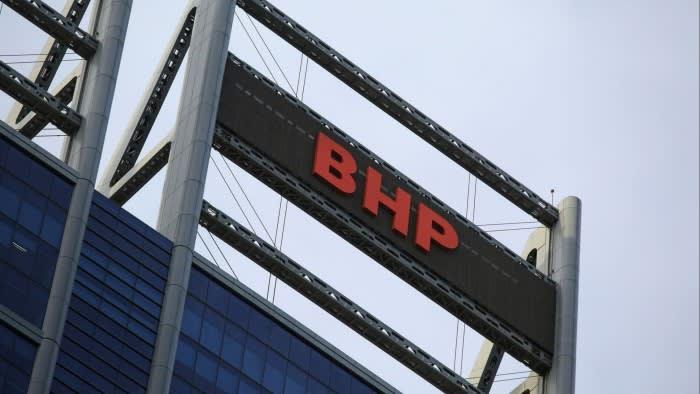Unlock the Editor’s Digest for free
Roula Khalaf, Editor of the FT, selects her favourite stories in this weekly newsletter.
BHP’s shares fell nearly 5 per cent on Friday as investors flagged their concern that the world’s biggest miner might have to pay more to seal its proposed £31bn offer for rival Anglo American.
The Australian miner’s all-stock offer for its smaller UK-listed rival is intended to boost its position as one of the world’s biggest copper and coal suppliers. BHP has said it wants a prior spin-off of Anglo’s South African iron ore and platinum divisions, which are independently listed, and will review Anglo’s other assets once the deal is completed.
BHP’s stock dropped 4.5 per cent in Australia on Friday as local investors said they were concerned about the complexity of the plan and whether the company would have to raise its offer substantially to seal the deal. News of the offer emerged on Thursday when Australian markets were closed for a public holiday.
Some large Anglo American shareholders said BHP’s offer undervalued the target company. “BHP has form in paying more than their first approach, so I suspect Anglo’s shareholders will not be left disappointed,” said one investor who did not want to be named.
A banker in the mining sector said the complexity of the proposed deal, as well as the significant political and antitrust risk, meant there would be uncertainty around BHP and Anglo American shares for some time. “There is a lot of water [still to go] under the bridge,” he said.
BHP is Australia’s largest company by market capitalisation, and the sell-off helped push the overall S&P/ASX 200 index down 1.4 per cent.
Kaan Peker, an analyst with RBC Capital Markets, said the initial offer looked opportunistic given the weakness of Anglo American’s share price. “A sweeter deal may be required,” he said.
The move on Anglo represents the latest attempt by Melbourne-based BHP — known colloquially as “The Big Australian” in its home market — to reshape the global mining industry.
Under Mike Henry, the Canadian company veteran who was appointed as chief executive four years ago, BHP has refocused its business on what it calls “future-facing” minerals, including copper, potash and iron ore, while disposing of its oil and gas exploration assets.
The drive to increase its exposure to copper triggered last year’s $6.4bn acquisition of South Australia’s Oz Minerals.
Anglo represents a much larger risk for BHP, and the prospective deal has been compared to its merger with Billiton, a London-listed South African miner, in 2001.
That deal added other metals, including aluminium and manganese, to BHP’s portfolio. It was in effect unwound in 2015, when BHP demerged most of the Billiton assets into a new company called South32.
Another BHP attempt to transform the sector was its offer to buy rival Rio Tinto in 2007. It would have created a dominant player in the global iron ore, coal, aluminium and copper markets, but the offer was rebuffed.
Deals have been smaller since, with BHP more focused on improving the productivity of its operations and selling off assets that do not fit its commodity outlook.
Peker said BHP would need to justify any deal with operational, strategic and synergy benefits. “Buying a peer on a control premium alone is not that palatable any more,” he said, referring to the value destruction caused by previous deals in the sector.
Credit: Source link













